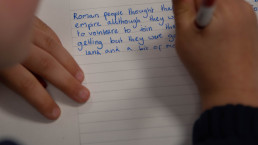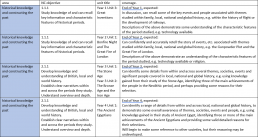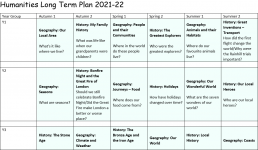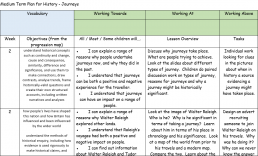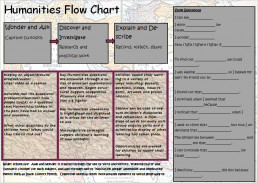History
Our Intent
National Curriculum Guidance
“Pupils should develop an awareness of the past, using common words and phrases relating to the passing of time. They should know where the people and events they study fit within a chronological framework and identify similarities and differences between ways of life in different periods. They should use a wide vocabulary of everyday historical terms. They should ask and answer questions, choosing and using parts of stories and other sources to show that they know and understand key features of events. They should understand some of the ways in which we find out about the past and identify different ways in which it is represented.
Pupils should continue to develop a chronologically secure knowledge and understanding of British, local and world history, establishing clear narratives within and across the periods they study. They should note connections, contrasts and trends over time and develop the appropriate use of historical terms. They should regularly address and sometimes devise historically valid questions about change, cause, similarity and difference, and significance. They should construct informed responses that involve thoughtful selection and organisation of relevant historical information. They should understand how our knowledge of the past is constructed from a range of sources.”
Our intent is that the teaching of history will:
- Help pupils gain a coherent knowledge and understanding of Britain’s past and that of the wider world to build respect, appreciation, and pride in their country and local area.
- Inspire pupils’ curiosity about the past and develop their understanding of key historical events, helping them understand how these have shaped the present.
- Ask perceptive questions, think critically, weigh evidence, sift arguments, and develop perspective and judgement.
- Review and discuss different sources and evaluate their significance.
- Understand the complexity of people’s lives, including those of the present, the process of change, the diversity of societies and beliefs.
- Celebrating differences.
- See the past as an inspiration for the future, and to flourish through their own enquiries into how what has been helps us make decisions for what is to come.
Our Implementation
The key areas of implementation we use are:
- Planning documents
- Progression map – by skill and by year
- Long Term Plan
- Medium Term plans
Flow Chart
The flow chart serves as an overview of how the subject is taught to ensure consistency in the following areas:
- Lesson structure
- Assessment
- Learning environment
- Resources
- Metacognitive scaffolding including knowledge organisers
- How we enhance the curriculum e.g. visits, celebrations, theme weeks
Impact
At St Oswald’s we see our children flourish through the wide-ranging curriculum to provide them with. We strive for the whole curriculum to be exciting, engaging and for all children to feel a sense of success.
In History, we aim for the impact to be:
- Children enjoy history. They tell us this in our pupil voice.
- Children are aware of the chronology of history, using timelines in every lesson.
- Children experience one school trip a year which enhances the history curriculum.
- Children can talk about famous people and the impact they have made on our lives today. They learn about courageous advocates.
